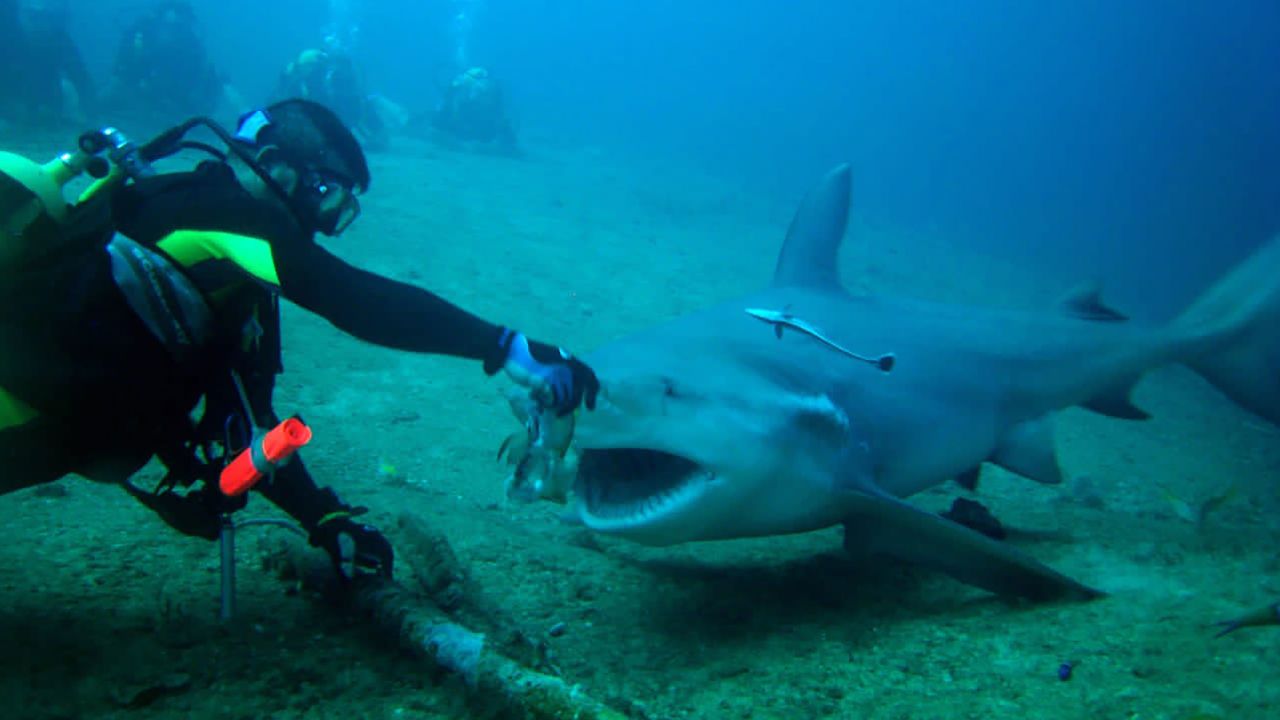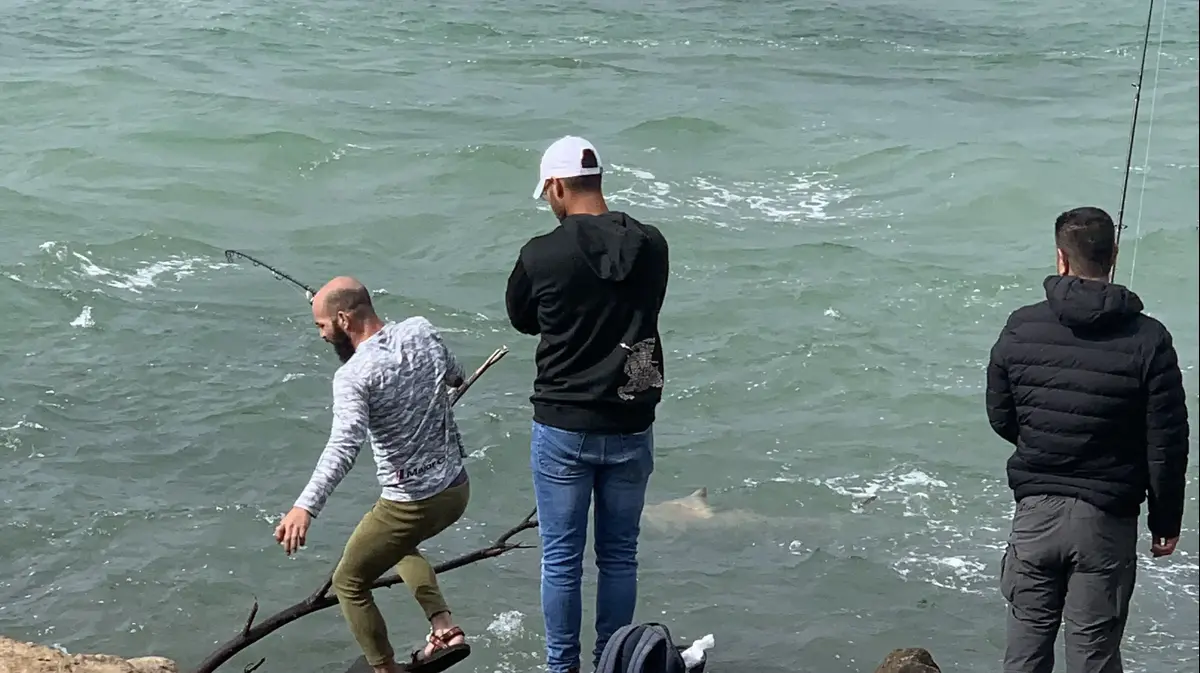They no longer fish for sharks, now they dedicate themselves to ecological tourism 3:56
Playa Santa Lucia, Cuba (CNN) --
The shark turns and swims directly at me.
There is only open sea between us, no cage to ward off the approaching bull shark, the species considered by many scientists to be the most aggressive in the world.
I'm beginning to have doubts about this mission.
Before entering the ocean, Oromelio "Oro" Rodriguez Salabarría, the Cuban dive instructor next to me, swore that he had never had a client bitten by a shark.
Not even a bite.
I had hired local guides and spent weeks dealing with different entities within the sprawling Cuban bureaucracy to set up a dive with these sharks.
The government-run Sharks Friends International Diving Center in the remote Cuban town of Playa Santa Lucía is the only place in the country, one of the few in the world, where divers can swim with bull sharks.
advertising
With over 350 teeth, a muscular appearance, and the occasional propensity to attack boats and people, bull sharks have a fearsome reputation.
However, attacks on humans are rare, while people regularly kill bull sharks for their fins, liver, and skin.
However, some governments - including Cuba's - are trying to protect the sharks and take advantage of a close encounter, fearing not that the sharks will scare visitors away from the beaches, but that they will attract them.
The Cuban government is promoting tour packages in which visitors experience the island's iconic vintage cars and cigars, followed by a dive with the toothed predators.
"People come to Cuba from all over the world to swim with the sharks," said Dan Whittle, senior director of the Environmental Defense Fund, a nonprofit group that in 2015 worked with the Cuban government, local scientists and fisheries to implement greater protections for marine life on the island.
"A live shark in the water in some of these national parks is worth hundreds of thousands of dollars," he said.
He estimates that shark tourism in Cuba adds up to millions of dollars a year.
Before the pandemic, the Playa Santa Lucía dive center used to attract shark enthusiasts from all over the world.
(Photo: Riccardo Lombardo/REDA&CO/Universal Images Group/Getty Images)
Oro, a gray-haired, deep-voiced dive instructor with more than 20 years of experience guiding shark dives, is enthusiastic about the topic.
"It's the myth that the shark is dangerous, a people eater, that it's aggressive," Oro says.
"Then you get to see a shark five feet away, and when you come out of the water, you're like, 'This is the best dive ever!'"
A growing industry
Tour operators in the Bahamas have already discovered what a big business shark diving can be.
According to a study published in Biological Conservation, in 2014, divers who visited the Bahamas to swim with sharks contributed more than $100 million to the local Bahamas economy.
While shark tourism in Cuba is a much smaller operation, guides are hopeful that the island's pristine reefs and increased efforts to safeguard the approximately 100 native shark species will attract visitors who have hitherto they have been slow to return since the pandemic.
Cuba wants to protect its sharks and take advantage of a close encounter.
(Photo: Sharks Friends diving center, Playa Santa Lucía, Cuba)
(Photo: Sharks Friends diving center, Playa Santa Lucía, Cuba)
Before Covid-19, the Playa Santa Lucia dive center used to attract shark aficionados from around the world, guides say.
Now customers are scarce.
Carrie Prevost, a Canadian tourist, was one of the few recent visitors who opted to swim with the bull sharks.
"It's a world where I don't belong, and it's very exciting to have the chance to do it. I'm excited and nervous at the same time," she told CNN.
As he donned his scuba gear for his first attempt to see the sharks, Prevost admitted that the theme song from the movie "Jaws" was playing in his head.
"I saw the movie very young, and I was scared to swim in pools, let alone the ocean, so this is a challenge to overcome," he added.
Marine biologists say that despite the great publicity that attacks on humans can generate, sharks are generally not a threat and are necessary to maintain healthy reefs and fish populations.
Sharks are millions of years older than dinosaurs
Shark dive guides have worked to educate local people on this point, arguing to local fishermen that sharks can bring tangible economic benefit.
"We tell the residents not to kill them, not to fish them. We are always working on it," says dive guide Lazaro Suarez Zayas.
"The bull shark is not endangered, but it is from this area, and we use it as a natural resource, so we must protect them."
Some guides, proud of their connection to animals, say they think the sharks recognize them.
As soon as he gets in the water for our shark dive, Lazaro quickly launches a few snappers.
He says that he wants to attract sharks but not overstimulate them.
At a depth of more than 25 meters underwater, we swim next to the remains of a Spanish ship that sank more than a century ago and Lazaro turns to me and makes the sign of a fin over his head with one of his hands.
At first, I see nothing in the piercing blue water.
Then a bull shark appears.
We sit at the bottom of the ocean while the shark circles.
It is longer than me.
Another shark arrives and the two quickly gobble up the fish that Lazaro has dispatched.
Lazaro feeds the shark directly into his mouth, withdrawing his hand at the last moment before his teeth close.
Bull sharks have a fearsome reputation, but attacks on humans are rare.
(Photo: Sharks Friends diving center, Playa Santa Lucía, Cuba)
The largest shark fixes its midnight black eyes on me and heads my way.
I remember what the guides said about not panicking, swimming or flailing around so the shark would think I'm hurt or easy prey.
Even though my pulse is racing, it's hard not to admire an animal so clearly in its element.
The shark swims after me.
I turn my head as I signal "ok" to Lazaro and Oro.
I think he's watching me.
For a few brief seconds, the circling shark holds my full attention as if there was nothing else in the world.
Will he attack or move closer for a closer look?
What can the guides really do to protect me?
It is exciting to be a few meters away;
Just as the guides promised me, this is already one of the best dives of my life.
Fortunately, my fascination with the shark is not mutual.
After a few approaches, the shark loses interest and slowly swims away.
SharksTourism










/cloudfront-eu-central-1.images.arcpublishing.com/prisa/2C5HI6YHNFHDLJSBNWHOIAS2AE.jpeg)




